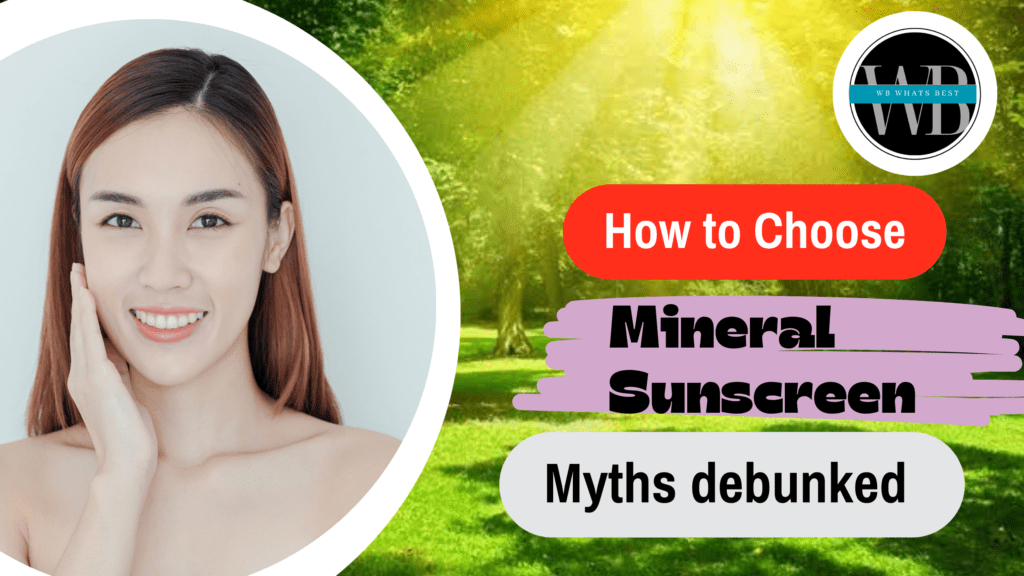Sunscreen is a non-negotiable component of any skincare routine, playing a pivotal role in protecting our skin from the harmful effects of the sun’s ultraviolet (UV) rays. Among the various types of sunscreens available, mineral sunscreen has gained popularity for its unique composition and skin-friendly properties.
What is Mineral Sunscreen?
Contents
- 1 What is Mineral Sunscreen?
- 2 Advantages of Mineral Sunscreen
- 3 How Mineral Sunscreen Works
- 4 Choosing the Right Mineral Sunscreen
- 5 Common Misconceptions About Mineral Sunscreen
- 6 Application Tips for Mineral Sunscreen
- 7 Mineral Sunscreen in Different Weather Conditions
- 8 Mineral Sunscreen vs. Chemical Sunscreen
- 9 Incorporating Mineral Sunscreen into Your Skincare Routine
- 10 Celebrity and Expert Recommendations
- 11 DIY Mineral Sunscreen – Yay or Nay?
- 12 Conclusion

Mineral sunscreen is a type of sunscreen that acts as a physical barrier or mirror that reflects the sun’s rays. It is also known as physical sunscreen. Mineral sunscreens are made up of two key ingredients: zinc oxide and titanium dioxide. These ingredients sit on top of the skin and deflect the sun’s rays away, providing highly effective UVA and UVB protection. In contrast, chemical sunscreens absorb the sun’s rays rather than reflecting them. Mineral sunscreens are considered to be more environmentally friendly than chemical sunscreens. Chemical sunscreens contain toxic substances that are destroying coral reefs and seeping into our bloodstreams. In contrast, mineral sunscreens are less harmful to the environment and are FDA-approved.
Advantages of Mineral Sunscreen
- Gentle on the Skin : One of the standout features of mineral sunscreen is its gentle nature. It’s a blessing for individuals with sensitive skin who might react adversely to the chemicals found in other sunscreens.
- Suitable for Sensitive Skin : For those prone to skin sensitivities, mineral sunscreen is a savior. The natural minerals used are less likely to cause irritation or allergic reactions.
- Immediate Effectiveness : Unlike some chemical sunscreens that require time to activate, mineral sunscreen provides instant protection upon application. This is especially beneficial for those spontaneous outdoor plans.
How Mineral Sunscreen Works
The magic behind mineral sunscreen lies in its ability to create a protective barrier on the skin’s surface. This barrier reflects UV rays, preventing them from penetrating the skin and causing damage.
- Reflecting and Scattering UV Rays : Zinc oxide and titanium dioxide, the key ingredients in mineral sunscreen, work in harmony to reflect UV rays away from the skin. This proactive approach sets mineral sunscreen apart from its chemical counterparts.
- Formation of a Protective Barrier: Imagine a shield guarding your skin against the sun’s onslaught. Mineral sunscreen forms a physical barrier that sits on the skin, ensuring comprehensive protection without compromising on comfort.
Choosing the Right Mineral Sunscreen
When navigating the world of mineral sunscreen, understanding the significance of Sun Protection Factor (SPF) is crucial. Selecting a product with an appropriate SPF level for your skin type and intended sun exposure is the first step.
- SPF Levels : The SPF level indicates the level of protection a sunscreen offers against UVB rays. Higher SPF values provide more protection, but it’s essential to balance this with individual skin needs and planned sun exposure.
- Additional Skincare Benefits : Beyond sun protection, many mineral sunscreens offer additional skincare benefits. These may include moisturizing properties, antioxidant effects, or even anti-aging benefits, making them versatile contributors to a comprehensive skincare routine.
Common Misconceptions About Mineral Sunscreen
Dispelling misconceptions is vital for understanding the true benefits of mineral sunscreen.
- Myth: It Leaves a White Cast : A common concern is that mineral sunscreen leaves a noticeable white cast on the skin, especially in individuals with darker skin tones. However, advancements in formulations have significantly minimized this effect, making modern mineral sunscreens more inclusive and suitable for diverse skin tones.
- Myth: Sunscreen Is Only for Sunny Days : Contrary to popular belief, UV rays are present even on cloudy or rainy days. Using sunscreen daily, regardless of the weather, is essential for maintaining skin health and preventing long-term damage.
Application Tips for Mineral Sunscreen
Applying mineral sunscreen effectively ensures optimal protection and a comfortable experience.
Quantity and Frequency
Applying an adequate amount of sunscreen is crucial. Aim for at least a nickel-sized amount for the face and a shot glass-sized amount for the body. Reapply every two hours, or more frequently if swimming or sweating, to maintain consistent protection.
Proper Application Techniques
Ensure even coverage by applying sunscreen in a gentle, circular motion. Pay extra attention to areas prone to sun exposure, such as the face, neck, and shoulders.
Mineral Sunscreen in Different Weather Conditions
Understanding how mineral sunscreen performs in various climates enhances its effectiveness.
Effectiveness in Various Climates
Mineral sunscreen remains effective in diverse weather conditions, from scorching summers to chilly winters. Its stability ensures reliable protection regardless of the climate.
Water-Resistant Properties
Many mineral sunscreens boast water-resistant properties, making them an excellent choice for water-related activities. However, it’s essential to reapply after swimming or excessive sweating for continuous protection.
Mineral Sunscreen vs. Chemical Sunscreen
Comparing mineral sunscreen with its chemical counterpart sheds light on both environmental and safety considerations.
Environmental Impact
Mineral sunscreens are often considered more environmentally friendly as they don’t contain certain chemicals that can harm marine life. Choosing a reef-safe mineral sunscreen contributes to protecting delicate ecosystems.
Safety Considerations
For individuals with sensitive skin or those concerned about potential chemical absorption, mineral sunscreen provides a safer alternative. It sits on the skin’s surface, minimizing the risk of skin reactions.
Incorporating Mineral Sunscreen into Your Skincare Routine
Understanding how to seamlessly integrate mineral sunscreen into your daily routine is key for consistent sun protection.
Morning Application
Apply mineral sunscreen as the last step in your morning skincare routine, before makeup if applicable. This ensures a protective base against UV rays throughout the day.
Layering with Other Products
Mineral sunscreen plays well with other skincare products. You can confidently layer it with moisturizers, serums, and makeup for a comprehensive skincare routine.
Celebrity and Expert Recommendations
Khloe Kardashian recommends
EltaMD UV Sunscreen, which has over 22,900 5-star reviews on Amazon and is a favorite among many celebrities, including Emma Stone, Hailey Bieber, Kendall Jenner, and Kourtney Kardashian.
Olivia Culpo recommends
Supergoop! (Re)setting 100% Mineral Powder Sunscreen SPF 35 PA+++. This powder sunscreen is great for those who worry about their skin getting oily, but still want to protect their skin from the sun. It’s a two-in-one product that provides both sun protection and oil control.
Please note that these are just two celebrity recommendations and you should always do your own research and choose a sunscreen that suits your skin type. If you have sensitive skin, look for a sunscreen that is labeled as “hypoallergenic” or “fragrance-free”. Always follow the instructions provided on the label of your specific sunscreen product.
DIY Mineral Sunscreen – Yay or Nay?
Exploring the concept of do-it-yourself mineral sunscreen involves weighing potential risks and benefits.
Risks and Benefits
While the idea of creating your own sunscreen may seem appealing, it comes with significant risks. Formulating an effective and safe sunscreen requires expertise and precision that DIY recipes often lack. Relying on commercially available, FDA-approved products ensures both efficacy and safety. There are many options of natural and organic sunscreen check it here
Importance of FDA-Approved Products
FDA-approved mineral sunscreens undergo rigorous testing to guarantee their effectiveness and safety. Opting for these products provides assurance that you are using a reliable and trustworthy sunscreen.
Conclusion
In conclusion, embracing mineral sunscreen as a fundamental component of your skincare routine is a wise decision. Its immediate effectiveness, gentle nature, and suitability for sensitive skin make it a standout choice for individuals of all ages. By incorporating mineral sunscreen into your daily regimen, you not only shield your skin from the sun’s harmful rays but also contribute to long-term skin health.
Is mineral sunscreen suitable for all skin types?
– Yes, mineral sunscreen is suitable for all skin types, especially for individuals with sensitive skin.
Does mineral sunscreen leave a white cast on the skin?
– Modern formulations have minimized the white cast effect, making them more suitable for diverse skin tones.
Can mineral sunscreen be worn under makeup?
– Absolutely! Mineral sunscreen provides an excellent base for makeup application.
How often should mineral sunscreen be reapplied?
– Reapply mineral sunscreen every two hours, or more frequently if swimming or sweating.
Is mineral sunscreen safe for children?
– Yes, mineral sunscreen is a safe option for children. However, it’s advisable to consult with a pediatrician for specific recommendations.

1 thought on “Glow Up Naturally: Unveiling the Magic of Mineral Sunscreen for Your Skin””